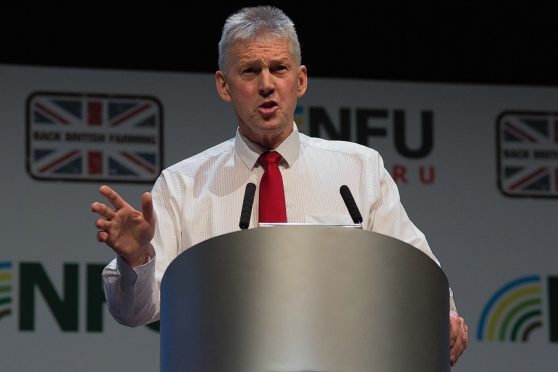Cutting ties with Europe would leave Scotland’s farmers facing a financial black hole as trade and subsidies would be put at risk, former MEP George Lyon has said.
Mr Lyon, a member of the Britain Stronger in Europe group, said claims leaving the EU would benefit farmers were fanciful, and that the sector would actually be plunged into years of uncertainty as new trade deals had to be thrashed out.
Speaking at the NFU conference in Birmingham on Wednesday, Mr Lyon who is a regular columnist in Press and Journal Farming, said voters needed to ignore claims the UK could ‘have all the good bits’ of the EU whilst no longer being part of it.
And he warned that Scotland’s farmers would be gambling their bottom lines if the country gave up its right to trade freely across Europe.
“Some 60% of our food and drink is exported to the EU, with millions of jobs created,” he told delegates.
“The EU hasn’t held the UK economy back – it’s helped make us one of the most successful economies in the world.”
In an impassioned speech, Mr Lyon said the EU provided UK farmers with a safety net in times of crisis, access to markets, and ensured producers weren’t disadvantaged against others in Europe.
“EU support is vital to the financial prosperity of our businesses,” he added, before he rejected claims that the UK Government would continue to provide subsidies to farmers outside the union.
“[In the most recent Cap reforms] the government’s negotiating position was a phase-out of subsidies,” he said.
“Would the UK Government prioritise agricultural interests in trade negotiations? Leaving will put things at risk and cost millions of pounds in a messy divorce.
“What’s more, we’d face having to comply with the same regulations if we wanted to agree a new trade deal with the EU, but we’d have to stand outside looking in when those regulations were agreed.”
Mr Lyon’s comments were at odds with Conservative MEP Daniel Hannan, who argued that leaving the EU would result in huge financial savings for the country, whilst protecting the interests of UK farmers.
Mr Hannan, who is also Secretary-General of the Alliance of European Conservatives and Reformists, said it was madness that the UK paid £4.6billion to the EU, but got back just £2.9billion from the Common Agricultural Policy.
“We could have a set acreage grant without any complexity,” he told delegates. “We would guarantee that for the next five to six years we would give £90/acre to farmers, bringing them closer to the EU average.”
Describing the EU as “arthritic” and a “clanking tube which dribbles out policies”, Mr Hannan said the UK should be given the opportunity to design its own agricultural policy which suited British farmers.
He said the UK would also push for a “free trade, global future”, arguing that British farmers could enjoy the benefits of EU trade without being encumbered by legislation and red tape.
“There are uncertainties in leaving, but there are uncertainties in staying too,” he added. “No one can see the future with complete knowledge, but the EU path leads to more stagnation.”
